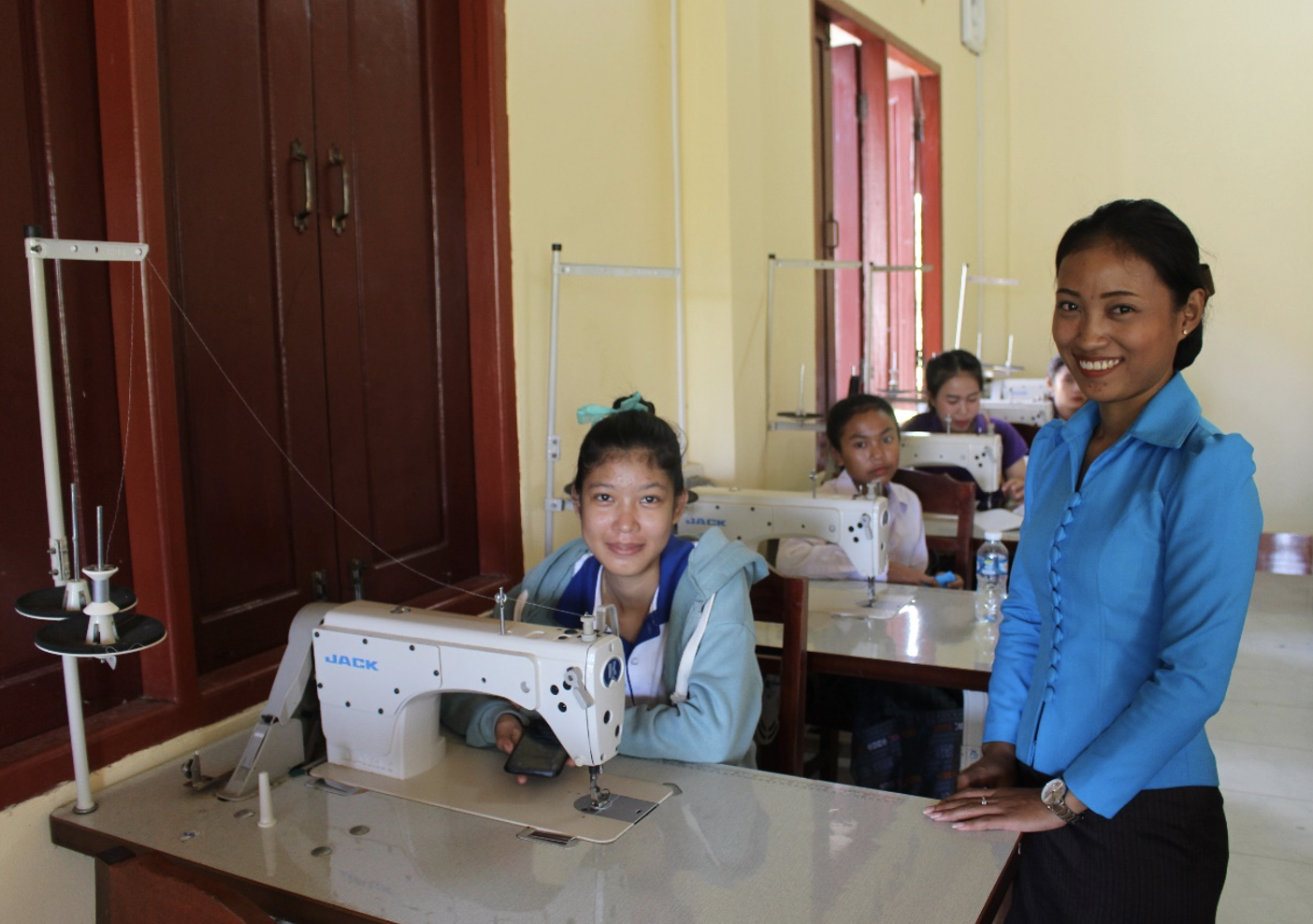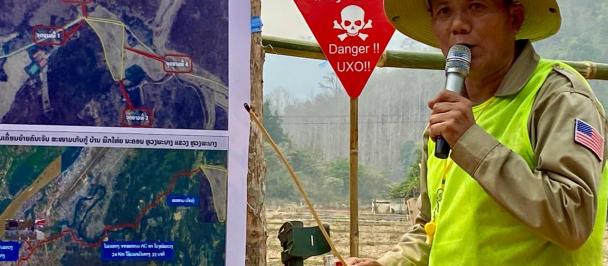A young tailoring mentor, making change one class at a time.
Echoing empowerment
September 29, 2021
Ms. Hatsada Kounlabouth and her student. Photo by: UNDP Lao PDR
Ms. Hatsada Kounlabouth, a young trainer from Saravane Province carried a soft voice, with a gentle and caring sparkle in her eyes, proudly approached her newly- graduated trainees. There were about 10 people who enrolled in this batch. At 27 years of age, she couldn’t believe that just 2 years earlier, she was also sitting behind those familiar machines, looking up at her own trainer.
Now she is training Ms. Thepkaysone Keovongsohd, who is also about to start a new family back in Ta-Oy District and Ms. Kongchaiy Keobouavanh, a 33 year-old mother of 2 from Samouay District. Both had traveled hours to stay at the Saravane Province Training Center.
They had been selected by their district Women’s training center to become apprentices, with the objective of becoming their own district’s future trainers for their local community. On the morning we met, they joyfully wore the blouses that they had tailored during class.
The most challenging period for Hatsada was during the first COVID-19 lockdown in 2020. Her trainees had just completed their first of three months training when they had to temporary stop. Since travelling was restricted, the students remained at the center and they utilized their time to help sew face masks for the isolated and under privileged communities. The first group of 8 trainees produced 500 face masks in that week and a new group joined later to help produce a total of about 1000 pieces on their following week of volunteering. It was a period when they were trying their best to stay physically distant, while meaningfully bond as a team. The only sidetrack was that, Hatsada had to re-teach all that has been taught before the sudden halt, delaying the time of completion for those trainees as a result.
From the left, Ms. Thepkaysone Keovongsohd, Ms. Hatsada Kounlabouth, and Ms. Kongchaiy Keobouavanh.
Kongchaiy later shared, “Before the pandemic, my family and I, like many others back home grew cassava and forage vegetables as a living. Tailoring is not a skill that locals can easily access. It would cost us quite a lot of money to enroll in classes like this and this kind of support is very much appreciated, especially now that the season has been dry here in our area. And harvests can’t deliver as much, or be as predictable like before because of the change in climate”.
At her district training center, there are about 3 machines and she hopes that the current make-shift classroom would be functional enough for a practical class sometime soon. Tailor shops are harder to find in the districts compared to that in the Saravane Province center. But, even if the market size grows and competition becomes a concern, it’s nothing that any of the three ladies are afraid of.
Thepkaysone confidently expressed, “You know what, the most important thing is that, whether you could make a living of it, or train others, the skill is yours and no one can take that away from you. Even if there are many tailor shops that open up in town because of the number of enrollments, you can still save money for other things by making your own clothes. The service charge can be a handful!”
Hatsada mentioned that it was rather difficult to find a decent job back when she graduated and doesn’t want anyone to go through her experience. She shared, “I have always enjoyed making my own clothes, though I hadn’t any clue that I’d have the capability to share my knowledge to now almost 5 batches of students!”
But, the trainer is certain that she has been one of the lucky ones. Many other individuals in Hatsada’s hometown have yet to be given the same opportunity to learn, and she is standing strong by her will to give back to her community. Her wish was and still is, to empower those less fortunate than herself to find a sustainable way to enhance their livelihoods, just as she has had the chance to.
........................................................
Working with the Lao Women’s Union (LWU), UNDP will support and promote national policies with district, provincial and central governments to improve rural livelihoods. Through the Strategic Support to Achieve SDG5 in Lao PDR project, it aims to increase household incomes, particularly the incomes of the most vulnerable female population, and to ensure food and nutrition security, as well as reduce poverty through participatory and inclusive approach (ISNC model).
Written by:
Ms. Aksonethip Somvorachit, Communications Analyst, UNDP Lao PDR.
The views expressed in this article are those of the authors alone and not the United Nations Development Programme.

 Locations
Locations




